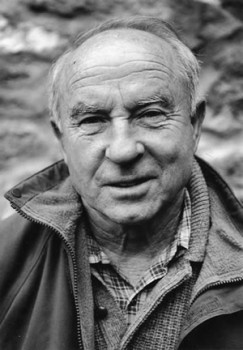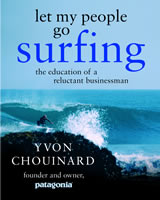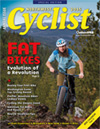Let My People Go Surfing: The Education of a Reluctant Businessman

Review and Interview by Becky Brun
“I’ve never considered myself a businessman,” said 66-year-old Yvon Chouinard, during his recent visit to Portland. “Businessmen are greaseballs.”
Whether he likes it or not, Patagonia founder Yvon Chouinard – a world-renowned climber, blacksmith, innovator, environmentalist and father of two – is one of the boldest and most well-respected businessmen in the country.
With only a high-school degree in auto mechanics, he has created a company that has been among the “100 Best Companies to Work for in America.” (Who wouldn’t want to work for a guy that, after you’ve been arrested for dressing up like a salmon while picketing fish farms, bails you out of jail?)
 In his latest book, he shares his uncommon business philosophy. It’s one that has helped Patagonia grow from generating $20 million in annual sales in the mid-80s to $250 million in annual sales today, led the company to donate $22 million to environmental organizations, and has diverted 86 million soda bottles from landfills, among other accomplishments.
In his latest book, he shares his uncommon business philosophy. It’s one that has helped Patagonia grow from generating $20 million in annual sales in the mid-80s to $250 million in annual sales today, led the company to donate $22 million to environmental organizations, and has diverted 86 million soda bottles from landfills, among other accomplishments.
In Let My People Go Surfing: The Education of a Reluctant Businessman, Chouinard explains how he went from selling climbing equipment that he forged himself from the back of his truck to becoming a multi-million dollar outdoor clothing manufacturer – while maintaining a commitment to the environment and to his employees. From the design and production stage to the retail of Patagonia products, Chouinard tells how he’s shaped a company that successfully blends work, play and social responsibility.
Taking advantage of his readers’ undivided attention, Chouinard has his moments of preaching (“Somewhere along the way individuals caused this whole mess, and it’s up to us to fix it.”) and most likely to the choir. But for the most part, his stories of making what seem impossible possible are nothing but inspirational.
Whether you are a business owner, an outdoor enthusiast, an environmental activist (or all three), you’ll undoubtedly take something from this book and implement it into your own life.
During his recent stop in Portland on what he called “the book tour from hell,” Chouinard took some time to talk with Outdoors NW.
ONW: In regards to your own money, it seems that you are against using foundations to give it away.
YC: People think I’m a communist for being against corporations and foundations, but I think we need to give away money now. I think that giving away $10 today is worth more than giving away $100 10 years from now because that $10 starts appreciating in the good that it does.
You look at people like Warren Buffet (who is the second-richest person in the world behind Bill Gates and has a net worth of $40 billion) – he’s saving all of his money now so he can give it away when he dies. I think he’s losing out on a lot of fun now.
ONW: Is it fun to give away 10 percent of your profits?
YC: Oh yeah. (He smiles.) It’s great fun. We give away 350 grants each year (they get 1,000 requests). A volunteer committee of employees goes through all of the applications. The process helps them develop an understanding of the issues and it gets them all fired up.
ONW: Can you explain 1% For the Planet (the philosophy and non-profit organization that encourages companies to donate one percent or more of annual sales to environmental groups)?
YC: We don’t look at it as charity. We look at it as an earth tax. Whether we have a good year or a bad year, we still give that money away. We have 175 members right now and it’s mostly smaller companies that want to do the right thing. I hope to attract larger companies that want to do it for its marketing value. If we could get enough companies to join, we could start a revolution.
ONW: What are you currently working on?
YC: We’re working with a Japanese mill to recycle all of our Capilene® underwear – which is made out of polyester – into new underwear. They built a $100 million facility and they want us to be the guinea pigs. When they melt it down and turn it into new fabric, we’ll only lose five percent of the material in the process and use only 20 percent of the energy it takes to make new ones. This is going to help us start closing the loop – it’s the first time it’s being done with clothing.
ONW: In your book, one of the things you tell your customers to do in order to reduce their impact on the environment is to buy used clothing as often as possible. If everyone did this, you’d be out of business.
YC: That’s OK. (He chuckles.) I never wanted to be a businessman in the first place.
— Becky Brun is the editor of OutdoorsNW.




Lexie Hallahan, Director NW Women's Surf Camps & Retreats, 3 years ago
Having been a buyer and general manager for Cleanline Surf Company, on the north coast of Oregon, for 17 years, I had the opportunity to connect our customers to the quality and excellence of the Patagonia company as one of their hand selected dealers. Now 8 years since working at Cleanline, I wear Patagonia daily. Most from the years I worked as their NW dealer. Their quality in workmanship, great customer service and outdoor resource, plastic recycled program used as fabrics, warranty on their products, and their great program of stewardship for our planet is one other companies should strive to emulate.